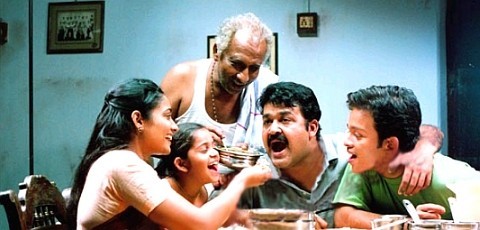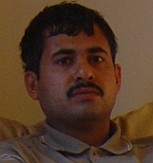Thanmathra
Watched the Malayalam film Thanmathra today at Sangeeth theatre. This is Blessy's directorial venture after Kazhcha, and tells the story of a middle-aged secretariat employee named Rameshan Nair, who is suffering from Alzheimer’s disease. The story is inspired from Padmarajan's short story called Orma.
Rameshan Nair (Brilliantly played by Mohanlal) lives in Thiruvananthapuram with his wife and two children. His father (Nedumudi Venu) had wanted him to become an IAS officer, but Rameshan was unable to fulfill his father's ambition. He is now hoping to make his son, who is a plus two student, an IAS officer, and this has been a wish of "three generations", he says. For his son, Rameshan Nair is a "friend, philosopher and guide". It was then that he starts forgetting his office files and bike keys, and is diagnosed of Alzheimer’s disease.
Memories are the most valuable things in Life. The horror that our memories are leaving us one by one - that would be a terrible feeling. One would have expected Blessy to make a film fully exploiting the talent of a great actor like Mohanlal, showing the tragedy of Rameshan Nair as he slowly sinks into forgetfulness. However, after few brief scenes of Rameshan forgetting minor things, Blessy abruptly converts him to a totally broken person overnight, after which he doesn't even recognize his wife and children. In the whole of second half, Mohanlal's role is something like that of mentally retarded person. I kept on wondering how the director will end the film, and expected something memorable, however, he disappointed there as well. It is evident that Blessy wanted to make a good artistic film, but unfortunately he doesn't succeed in that completely.

A Scene from Thanmathra (Courtesy thanmathra dot com)
Thanmathra has several scenes crafted touchingly, mainly portraying the relationship between Father and Son. Rameshan Nair narrating his childhood days in which he had lied to his mother, and his son crying and admitting that he had also lied, Rameshan Nair creating a mock fight with his father as he is about to bid farewell to him - all are examples. In another memorable scene in the second half, Rameshan Nair recognizes his childhood girlfriend, as his wife stands and watches them helplessly.
However, Blessy is not consistent in blending the scenes with sensitivity. His portrayals of the harshness of the World go to the extremes, and are nearly unbelievable. The scene of farewell program that the secretariat employees organize for Rameshan Nair, is an example. All his colleagues look totally unaffected by Rameshan's tragedy. His son (don’t know the name of the actor) speaks smartly but there is a touch of artificiality when he dictates the retirement application for his father. It looked like the audience were getting affected by this, and they were taking these scenes as comic and laughing loudly. In a later scene, the director kills a character called Joseph (Jagathi). Probably he wanted to portray Human Tragedy, but I felt that this was totally out of place.
The Music by Mohan Sithara and the technical department is excellent, and I liked the "kattu viriyithe kannamma" song especially, which fits well in the film.
Rameshan Nair (Brilliantly played by Mohanlal) lives in Thiruvananthapuram with his wife and two children. His father (Nedumudi Venu) had wanted him to become an IAS officer, but Rameshan was unable to fulfill his father's ambition. He is now hoping to make his son, who is a plus two student, an IAS officer, and this has been a wish of "three generations", he says. For his son, Rameshan Nair is a "friend, philosopher and guide". It was then that he starts forgetting his office files and bike keys, and is diagnosed of Alzheimer’s disease.
Memories are the most valuable things in Life. The horror that our memories are leaving us one by one - that would be a terrible feeling. One would have expected Blessy to make a film fully exploiting the talent of a great actor like Mohanlal, showing the tragedy of Rameshan Nair as he slowly sinks into forgetfulness. However, after few brief scenes of Rameshan forgetting minor things, Blessy abruptly converts him to a totally broken person overnight, after which he doesn't even recognize his wife and children. In the whole of second half, Mohanlal's role is something like that of mentally retarded person. I kept on wondering how the director will end the film, and expected something memorable, however, he disappointed there as well. It is evident that Blessy wanted to make a good artistic film, but unfortunately he doesn't succeed in that completely.

Thanmathra has several scenes crafted touchingly, mainly portraying the relationship between Father and Son. Rameshan Nair narrating his childhood days in which he had lied to his mother, and his son crying and admitting that he had also lied, Rameshan Nair creating a mock fight with his father as he is about to bid farewell to him - all are examples. In another memorable scene in the second half, Rameshan Nair recognizes his childhood girlfriend, as his wife stands and watches them helplessly.
However, Blessy is not consistent in blending the scenes with sensitivity. His portrayals of the harshness of the World go to the extremes, and are nearly unbelievable. The scene of farewell program that the secretariat employees organize for Rameshan Nair, is an example. All his colleagues look totally unaffected by Rameshan's tragedy. His son (don’t know the name of the actor) speaks smartly but there is a touch of artificiality when he dictates the retirement application for his father. It looked like the audience were getting affected by this, and they were taking these scenes as comic and laughing loudly. In a later scene, the director kills a character called Joseph (Jagathi). Probably he wanted to portray Human Tragedy, but I felt that this was totally out of place.
The Music by Mohan Sithara and the technical department is excellent, and I liked the "kattu viriyithe kannamma" song especially, which fits well in the film.


8 Comments:
Dear Ratheesh,
Read the review. Will try and see it this week
Surprised to note that Blessy has failed partly in showing the transition of Lal's character from a full-fledged normal person to a full-fledged alzheimer patient.
I was thinking that this will be in the same class as Kaazcha.
Kaazcha scored due to its sensitive portrayal of characters and the continuity of the story
Regards
Suraj
This comment has been removed by a blog administrator.
Dear Suraj,
Thanmathra is also a good and different film as per today's Malayalam movie standards, and establishes Blessy as one of the very few Malayalam film directors who take the media seriously.
However, I think I had gone for the film with higher expectations, hence was disappointed.
Regards,
Ratheesh
hi Ratheesh,
Saw the movie today. If u consider everything i thought movie was excellent especially the story line and the portrayal of character.
Though some of the mistakes u pointed out are right, u got to forgive them since such things happen in every films.This film is better in that sense compared to many successfil ones. I think that the films end was also fitting.
Its very different from kazhcha.I wudn't say Kazhcha was any better. This film portrays tragedy of human life.A gr8 expression of life.
Hats of to u for the careful observation
Hi,
First time on ur blog. There are a few things that I would discuss regarding the film.
1) All throughout the film, the concept of a father trying to live his dreams thru is son is encouraged. No where does anyone offer a counter-view that the sons life is his own and that he should fulfill his own dreams.
2) The female characters in the movie are sterotyped to extreme. The wife is shown as a typical mega-serial woman who cant even support her children when the father falls apart, her son has to take responsibility. And the daughters education is not even mentioned.
3) The movie dragged on for too long and the end was a big disappointment.
Obviously, the director has lots to correct.
nn,
Your point regarding "daughter's education" somehow reminded me of those interesting film reviews that GP Ramachandran used to write in Deshabhimani weekly during the 90s, which insisted that all films should have characters having a progressive outlook, and preferably be members of the communist party, and that films should give the viewers messages regarding all positive matters in social life, like children's education, empowerment of women, upliftment of socially backward classes, etc.
I agree with you that Thanmathra had several stereotypes, like in the characterizations of the father-in-law (played by Innocent), the wife, and in the portrayals of teenage romance (or in hints of that) between the school students, in the beginning of the film. We can even argue that the portrayals of the "happy days" of the family in the first half had a bit of clichéd look, trying to create a "feel good" sensation for intensifying the tragedy in later scenes.
I think Blessy just had a wafer-thin theme of a person sinking into forgetfulness. It would have been probably good to make an abstract film based on this theme, but Blessy preferred to sugar-coat it with father-son relation, etc. to probably appeal the sentiments of a traditional family movie viewer. I haven't read Padmarajan's short story, but I wouldn't be surprised if these extensions in the story are just Blessy's additions. He created many touching scenes in this way, but somehow it gave the impression that he was trying to tell too many things at a time.
All this said, I would repeat that Blessy's intentions were clearly not to make just money out of this film, but to create a good viewing experience. That would make us forgive all these shortcomings. And Thanmathra is probably the best Malayalam film made in last year.
Regards
Ratheesh
Ratheesh,
I agree with your viewponts on Thammathra. I felt mostly the very same way: while the director nicely brought out the effect of the disease on Rameshan Nair, I was hoping for them to show how the family and the patient survives and wins over (if not, attempts to win) the battle. maybe the director wasnt really intending to message anything here.. was rather plainly focused on showing how strongly the disease could affect someone.
i really dont think there can be another actor who can do this role so naturally, like mohanlal... amazing is just a small word to appreciate the actor. leave u with heavy heart ...:)
true situation in a life. anything can happen anytime :( nice film from blessy. as u said, jagathy's character being killed was a lil unwanted.
Post a Comment
<< Home